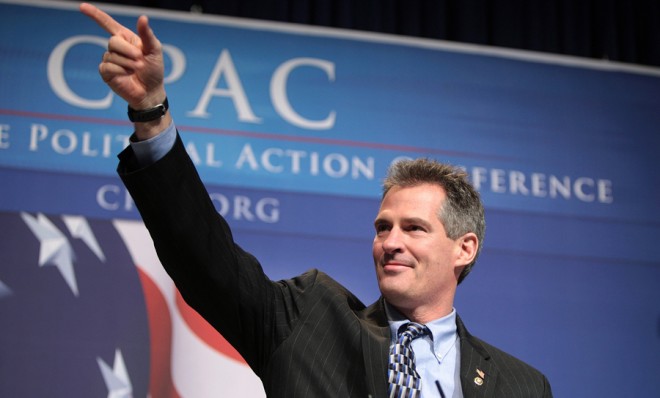Why even a losing presidential bid would help Scott Brown
The former Massachusetts senator is hoping his call for a big-tent GOP will catch on


Former U.S. Sen. Scott Brown of Massachusetts spent the weekend in Iowa, a critical early presidential primary prize, and confirmed to reporters that he is considering launching a bid for the White House in 2016. "I'm going to be coming out more often to try to determine whether there's an interest in my brand of leadership and Republicanism," Brown told The Des Moines Register.
Brown became a GOP hero in 2010 when he beat Democratic opponent Martha Coakley to take the late Ted Kennedy's seat — a rare Republican victory in the deep-blue state. But he lost his 2012 re-election to Elizabeth Warren.
The conventional wisdom is that Brown would have a tough time winning over GOP primary voters, especially after another Massachusetts moderate, Mitt Romney, lost what Republicans viewed as a winnable race against a vulnerable President Obama in 2012. As Patrick Howley notes at The Daily Caller, even many Republicans in Brown's home state soured on him when he tried to lure centrists away from Warren with his "People over Party" slogan.
The Week
Escape your echo chamber. Get the facts behind the news, plus analysis from multiple perspectives.

Sign up for The Week's Free Newsletters
From our morning news briefing to a weekly Good News Newsletter, get the best of The Week delivered directly to your inbox.
From our morning news briefing to a weekly Good News Newsletter, get the best of The Week delivered directly to your inbox.
Alex Seitz-Wald at Salon is more blunt: "Scott Brown will never win a Republican primary. Not even close. The primary process is dominated by the most ardent GOP voters and activists; the kinds of people who want a red-blooded conservative populist, not some self-proclaimed 'bi-partisan problem solver' who bent over backwards in his 2012 race to paint himself as a moderate salve to the Tea Party's intransigence."
If Brown, now working as a lawyer, is such a long shot, what will he get out of publicly floating the possibility of a presidential bid? Here's how Seitz-Wald sees it:
First of all, it almost never hurts to fake a run for the presidency. If expectations are low, and they definitely are for Brown... , then you have nowhere to go but up. A failed bid that manages to capture at least a sliver of the electorate and last past New Hampshire — where Brown would presumably be strong — can keep you relevant, boost your visibility, and get you booked on TV. [Salon]
Even if Brown doesn't wind up running, he's boosting his national name recognition by hitting the Iowa State Fair at the same time as other politicians who are starting to test the waters. Iowa Republican committee chairman A.J. Striker and other GOP leaders praised Brown for advocating a big-tent party. That kind of praise could help him, no matter what his next move is. Here's Margaret Hartmann at New York:
Even if people aren't interested in nominating another Republican from Massachusetts (who's less experienced than Mitt Romney), being talked about as a potential candidate won't hurt his chances if he decides he wants to be the governor in his home state, a senator from Massachusetts or New Hampshire [where he has a second home]. [New York]
Of course, there's another reason this trial balloon might pay off. Brown might prove his doubters wrong, as he did when he defied the odds to win liberal lion Kennedy's seat. "It's not a ridiculous notion," says David S. Bernstein at Boston Magazine. "He's a pretty well-known entity among Republican primary voters; he would likely inherit much of the Romney operation; and he could perhaps be the lone (relative) moderate while a field of conservatives split the rabid base."
A free daily email with the biggest news stories of the day – and the best features from TheWeek.com
Harold Maass is a contributing editor at The Week. He has been writing for The Week since the 2001 debut of the U.S. print edition and served as editor of TheWeek.com when it launched in 2008. Harold started his career as a newspaper reporter in South Florida and Haiti. He has previously worked for a variety of news outlets, including The Miami Herald, ABC News and Fox News, and for several years wrote a daily roundup of financial news for The Week and Yahoo Finance.
-
 Political cartoons for January 29
Political cartoons for January 29Cartoons Thursday's political cartoons include 2nd amendment dibs, disturbing news, and AI-inflated bills
-
 The Flower Bearers: ‘a visceral depiction of violence, loss and emotional destruction’
The Flower Bearers: ‘a visceral depiction of violence, loss and emotional destruction’The Week Recommends Rachel Eliza Griffiths’ ‘open wound of a memoir’ is also a powerful ‘love story’ and a ‘portrait of sisterhood’
-
 Steal: ‘glossy’ Amazon Prime thriller starring Sophie Turner
Steal: ‘glossy’ Amazon Prime thriller starring Sophie TurnerThe Week Recommends The Game of Thrones alumna dazzles as a ‘disillusioned twentysomething’ whose life takes a dramatic turn during a financial heist
-
 The billionaires’ wealth tax: a catastrophe for California?
The billionaires’ wealth tax: a catastrophe for California?Talking Point Peter Thiel and Larry Page preparing to change state residency
-
 Bari Weiss’ ‘60 Minutes’ scandal is about more than one report
Bari Weiss’ ‘60 Minutes’ scandal is about more than one reportIN THE SPOTLIGHT By blocking an approved segment on a controversial prison holding US deportees in El Salvador, the editor-in-chief of CBS News has become the main story
-
 Has Zohran Mamdani shown the Democrats how to win again?
Has Zohran Mamdani shown the Democrats how to win again?Today’s Big Question New York City mayoral election touted as victory for left-wing populists but moderate centrist wins elsewhere present more complex path for Democratic Party
-
 Millions turn out for anti-Trump ‘No Kings’ rallies
Millions turn out for anti-Trump ‘No Kings’ ralliesSpeed Read An estimated 7 million people participated, 2 million more than at the first ‘No Kings’ protest in June
-
 Ghislaine Maxwell: angling for a Trump pardon
Ghislaine Maxwell: angling for a Trump pardonTalking Point Convicted sex trafficker's testimony could shed new light on president's links to Jeffrey Epstein
-
 The last words and final moments of 40 presidents
The last words and final moments of 40 presidentsThe Explainer Some are eloquent quotes worthy of the holders of the highest office in the nation, and others... aren't
-
 The JFK files: the truth at last?
The JFK files: the truth at last?In The Spotlight More than 64,000 previously classified documents relating the 1963 assassination of John F. Kennedy have been released by the Trump administration
-
 'Seriously, not literally': how should the world take Donald Trump?
'Seriously, not literally': how should the world take Donald Trump?Today's big question White House rhetoric and reality look likely to become increasingly blurred
